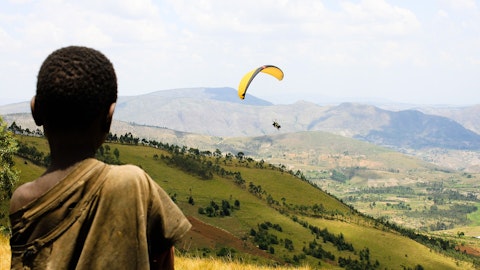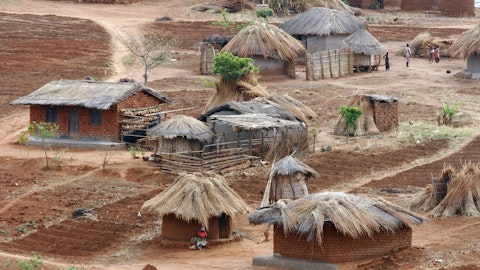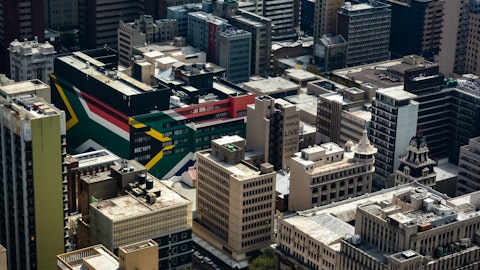In this article, we will look at the 20 Countries with the Highest Perception of Corruption in the World.
Surging Corruption Across the World
Corruption is on the rise across the world, with limited efforts to combat it. According to the 2023 corruption perception report by Transparency International, 80% of the total world population lives in countries with high corruption, while, only 10% live in the top 25 countries with low corruption. However, it remains the biggest challenge in most of the economies.
Countries with strong judiciary systems are less prone to corruption. There has been very limited progress against corruption globally due to the weak justice systems and even weaker investigation processes. The incompetency of the justice system results in no penalty for these organized crimes ranging from bribery and embezzlement to grand corruption. Moreover, it is often influenced by higher power and interference from external forces. This abuse of power can lead to centuries of suffrage for societies. Corruption and injustice go hand in hand. Justice cannot prevail in a corrupt nation, similarly, corruption thrives in an inadequate justice system that cannot uphold the rule of law.
Since 2012, after the Corruption Perception Index scores became comparable, Ireland and Seychelles are the only countries that experienced significant growth. Many high-ranking countries have worsened in terms of corruption. For instance, Australia and Canada have dipped 10 and 8 points, respectively, since 2012. Many other countries in Europe and the Americas have declined further. However, they are working towards improving their judicial process as an anti-corruption effort. Recently, Portugal’s government approved stricter anti-corruption measures, allowing the justice system to confiscate the assets of suspects without a conviction. This move by the government is aimed at deterring corruption, as a response to several high-profile corruption cases involving politicians, bankers, and business executives. It also targets lobbying regulations and pledges to speed up the legal procedures. The opposition counters these proposed changes, arguing that these rules might undermine the legal principles.
You can also look at the 30 Countries Most Affected by Terrorism.
Corruption in Africa
Corruption is one of the major barriers to the economic and social development of Africa. It affects the overall quality of life in the region, hindering basic freedom of speech and accountability rights. Corruption in Africa is a result of poor governance and weak institutions, hampering the structural transformation of the region. In the 2023 corruption perception index, 44 out of 49 countries in Africa score less than the global average of 43. The cost of corruption is substantial with Africa losing billions of dollars to illicit financial outflows annually. According to the African Union and United Nations Economic Commission for Africa, the region loses nearly $50 billion every year to illicit financial activities, exceeding the total development aid, grants, and budget support it receives from developed countries.
The African Union Convention on Preventing and Combating Corruption (AUCPCC) is a primary framework for combating corruption in African countries. However, the implementation of its provisions is still a major challenge in many countries. For instance, money laundering has been declared illegal in many countries but the inadequate prevention and prosecution framework is still challenging. This is also due to the lack of resources, inadequate collaboration between authorities and prosecutors, and lack of a strong judiciary system. Another major area where Africa lacks transparency is political party funding. Many African countries fail to ensure transparency in political funding processes, leading to unlawful influences. African governments must address these issues, by preventing illegal monetary influences on political parties and illicit financial outflows by closing loopholes and ensuring the public availability of financial reports. Moreover, the protection of whistleblowers is another important step toward ensuring a corruption-free Africa.
Mining Sector in Africa
Africa is home to 30% of the total mineral reserves and has a considerable share of the global production of economically viable minerals and metals. Like other industries in Africa, Mining has also been subjected to corruption. However, several efforts are being made to curb the effects of corruption on mining and to prevent further bribery and corruption incidents. The Extractive Industries Transparency Initiative (EITI), a Norwegian initiative for transparency in extraction industries, works closely with African governments and authorities to promote governance by improving transparency in its extractive industries. Mining is an important sector in Africa, contributing over 10% to its economy. AngloGold Ashanti Limited (NYSE:AU) is a leader in the African mining sector. The company has a zero-tolerance policy against bribery and corruption. Violating these policies can lead to consequences such as termination, fines, and imprisonment.
AngloGold Ashanti Limited (NYSE:AU) is one of the largest gold mining companies. It specializes in the exploration and extraction of gold and also produces silver and sulphuric acid as by-products. The company continues to explore and acquire new mines to ensure a strong pipeline of future developments. The leading gold miner produced 2.6 million ounces of gold in 2023, signifying its operational strength. Moving forward, AngloGold Ashanti Limited (NYSE:AU) expects to benefit from promising reserves of readily available 60 million ounces of gold, with an additional production potential of 46 million ounces for future development. Its strong resource base positions it as a leader in the gold industry with a promise of continued growth. The company also significantly contributes to the job market in Africa and across its other regions of operation. In 2023, it employed more than 33,000 people.
The rising gold prices can potentially improve AngloGold Ashanti Limited’s (NYSE:AU) performance, as its core business is gold mining with a presence in key gold regions across the world like Tanzania, the Democratic Republic of Congo, Ghana, Guinea, Australia, the US, Brazil, Argentina, and Colombia. It is not dependent on one location for its success and continues to benefit from its geographically diverse operation. AngloGold Ashanti Limited (NYSE:AU) prioritizes responsible mining practices throughout the lifecycle of a mine, including rehabilitation of the environment once the mining is complete and a smoother transition for the affected communities.
AngloGold Ashanti Limited (NYSE:AU) is off to a great start in 2024, achieving 2% year-over-year production growth in Q1 reaching 581,000 ounces. The growth is further strengthened by its strong performance across its global portfolio. Its Brazilian mines, Cuiabá and Serra Grande witnessed a 55% and 40% surge in their production, respectively. The company is committed to long term growth and is actively on a search for new gold reserves. In 2023, it invested more than $40 million to explore promising locations across five countries. It also recently acquired additional shares in G2 Goldfields Inc., bringing its total ownership to over 15% of its outstanding shares. G2 Goldfields Inc. is exploring gold prospects in Guyana, which if turns out to be a success can benefit AngloGold Ashanti Limited (NYSE:AU) given its 15% shares in the company.
Now, let’s look at the countries with the highest perception of corruption in the world. You can also look at 20 Richest people in Africa.

Gajus/Shutterstock.com
Methodology
To compile our list of the 20 countries with the highest perception of corruption in the world, we consulted the corruption perception index (CPI) by Transparency International. The indicator ranks countries based on the perceived levels of public sector corruption. A higher corruption perception score out of 100 indicates corruption-free countries whereas a lower score represents the most corrupt countries. Our list ranks countries in descending order of their CPI score.
20 Countries with the Highest Perception of Corruption in the World
20. Eritrea
Corruption Perception Index (2023): 21 out of 100
Eritrea is ranked among the top 20 countries with the highest perception of corruption in the world. The East African country has been subjected to corruption for decades and the situation has only worsened. Inadequate democratic institutions, limited access to justice, and the authoritarian nature of government contribute to the high persistence of corruption in the country.
19. Afghanistan
Corruption Perception Index (2023): 20 out of 100
Afghanistan is ranked 19th on our list. The country significantly improved its score in 2022 and the Taliban claimed credit for it. Regardless, Transparency International’s communication manager said that there has been a reduction in corruption and bribery in the country, yet, there is no proof of a systematic reduction. In 2023, the score took a dip of 4 points.
18. Burundi
Corruption Perception Index (2023): 20 out of 100
Corruption is deeply rooted in the political and social systems of Burundi. The corrupt officials benefit from impunity in the country when exposed for their wrongdoing. From 1985 to 2013, the country lost an estimated $3.7 billion to illicit financial flows. In 2023, it scored 20 out of 100 on the corruption perception index.
17. Chad
Corruption Perception Index (2023): 20 out of 100
Chad is ranked among the countries with the highest perception of corruption in the world, due to its poor ranking on the Corruption Perception Index. The country has been described as a hereditary kleptocracy, a system with unlimited grand corruption, after the transfer of power from its long-time rule to his son.
16. Comoros
Corruption Perception Index (2023): 20 out of 100
Corruption in Comoros is present at all levels from its judiciary to social systems. The lack of judicial independence in the country is one of the biggest causes of corruption. It is ranked 16th on our list.
15. Democratic Republic of Congo
Corruption Perception Index (2023): 20 out of 100
The Democratic Republic of Congo constantly ranks among the countries with the highest perception of corruption. Its constitution includes laws against corruption however, the implementation of those laws is rare. It is ranked 15th on our list of the countries with the highest perception of corruption.
14. Myanmar
Corruption Perception Index (2023): 20 out of 100
Myanmar is ranked among the countries with the highest perception of corruption. Recently, efforts have been made against corruption in the country but those are more focused on internal power struggles rather than actual reforms. The country has a corruption perception index score of 20 out of 100.
13. Sudan
Corruption Perception Index (2023): 20 out of 100
Sudan has been deeply entrenched in corruption due to its dictatorship regime of 30 years, affecting all facets of its judiciary system, policymaking, and public services. Sudan was characterized as a Kleptocracy due to its corrupt government, supported by its military. It is ranked 13th on our list.
12. Tajikistan
Corruption Perception Index (2023): 20 out of 100
Tajikistan faces rampant corruption, nontransparent practices, poor infrastructure, and an inadequate regulatory process, which significantly hamper private investments in the country. Foreign direct investment has dipped by 50% since 2020 in Tajikistan. It is ranked 12th on our list.
11. Libya
Corruption Perception Index (2023): 18 out of 100
Libya is one of the countries with the highest perception of corruption in the world. In 2023, the country scored 18 out of 100 on the corruption perception index.
10. Turkmenistan
Corruption Perception Index (2023): 18 out of 100
Corruption has permeated into the judicial and economic systems of Turkmenistan, with the officials supporting or directly engaging in it. Moreover, weak governance and the absence of effective anti-corruption measures further add to the problem. It is ranked 10th on our list.
9. Equatorial Guinea
Corruption Perception Index (2023): 17 out of 100
Equatorial Guinea is ranked among the countries with the highest perception of corruption. Its vice president, Teodorin Nguema Obiang Mangue has been prosecuted for corruption in multiple jurisdictions including the United States. The country has a score of 17 out of 100 on the corruption perception index.
8. Haiti
Corruption Perception Index (2023): 17 out of 100
Haiti faces a humanitarian tragedy with over 4,451 people killed in 2023 and 1,668 injured due to gang violence. The numbers have further increased in the first quarter of 2024 with 1,554 people killed up to 22nd March, according to the UN. The major factors contributing to this crisis are the illicit economy, corruption, and pervasive impunity in the country.
7. Nicaragua
Corruption Perception Index (2023): 17 out of 100
Corruption has been institutionalized in Nicaragua under the Ortega regime, which has been in control since 2007. The regime has dismantled all public accountability institutions and has turned them into beneficiaries of its corrupt practices. The nation is ranked 7th on our list.
6. North Korea
Corruption Perception Index (2023): 17 out of 100
The residents of North Korea are entrenched in corruption, repression, and all sorts of social and economic crises, under its authoritarian regime. It is ranked among the countries with the highest perception of corruption.
5. Yemen
Corruption Perception Index (2023): 16 out of 100
Corruption has aggravated the humanitarian crisis in Yemen. In 2023, it scored 16 out of 100 on the corruption perception index and is ranked 5th on our list.





